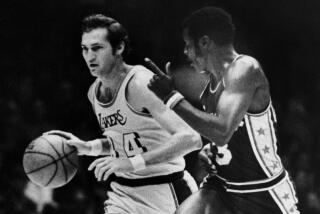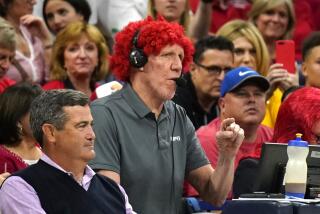From the Archives: Basketball’s Wilt Chamberlain Dies at 63
Wilt Chamberlain, the towering center who dominated professional basketball in the 1960s and early ‘70s and once scored 100 points in a game, was found dead Tuesday in his Bel-Air home.
The 63-year-old Chamberlain, who helped the Los Angeles Lakers to a National Basketball Assn. championship in the 1971-72 season, apparently died of a heart attack.
Chamberlain, who had a history of heart trouble, was found in bed about 12:30 p.m. by a longtime employee, according to Los Angeles police. Paramedics pronounced Chamberlain dead at 12:41 p.m.
Well before Michael Jordan laid claim to the title, the 7-foot, 1-inch Chamberlain was considered by many people to have been the best basketball player of all time, and some of his records have never been broken. Among them is his 100-point performance on March 2, 1962, in a game against the New York Knicks in Hershey, Pa., an accomplishment considered impossible before he did it and utterly remarkable ever since.
He also once claimed in an autobiography to have had sex with 20,000 women, a feat that was considered equally improbable but that, unlike his basketball records, was impossible to verify.
Chamberlain, known as “Wilt the Stilt,” a nickname he detested, and “the Big Dipper,” which he preferred, scored 31,419 points in an NBA career that lasted from 1959 until 1973. He played on three NBA teams—the Philadelphia (later San Francisco) Warriors, the Philadelphia 76ers and the Lakers—and changed the way basketball is played, starting a shift toward domineering big men who owned the territory around the basket.
He helped lead the Lakers to a victory over the Knicks in the 1971-72 championship playoffs, and his jersey, along with those of his teammates, Elgin Baylor, Jerry West and Gail Goodrich, was retired by the club. Chamberlain was the most valuable player of the 1972 playoffs. He also was the league MVP four times and led the league in scoring for seven straight seasons.
“Wilt was one of the greatest ever, and we will never see another one like him,” retired Laker Kareem Abdul-Jabbar said Tuesday. Abdul-Jabbar, whose relations with Chamberlain were chilly, is the only person to have scored more points in an NBA career.
Chamberlain grabbed more rebounds than any other player, 23,924, and made it through his career without ever fouling out of a game. He was also known as a miserable free-throw shooter whose ungainly, underhand tosses from the line were something of an NBA joke.
Seymour Goldberg, Chamberlain’s attorney and a close friend for 40 years, appeared Tuesday afternoon at an impromptu news conference in Chamberlain’s driveway with several of the basketball player’s relatives, including two brothers, Wilbert and Oliver Chamberlain, and a sister, Barbara Lewis.
A History of Heart Problems
Goldberg said Chamberlain, who was hospitalized for an irregular heartbeat in 1992, had been seeing a heart specialist and was taking regular medication for his heart.
“We think it may have been a heart attack,” he said.
Chamberlain’s former teammates first realized the seriousness of his heart problem when they gathered at the Forum in 1992 for a halftime ceremony marking the anniversary of their 1971-72 NBA championship. Chamberlain had to leave the ceremony early.
“He couldn’t catch his breath,” said Wen Roberts, a former Laker team photographer. “He went straight to the hospital. He wasn’t messing around with it.”
But Chamberlain showed few signs of slowing down, according to Fluke Fluker, a friend who worked out with him at a San Fernando Valley health club as recently as three weeks ago.
“He’d be on the treadmill and Stair-Master for an hour and a half,” said Fluker, a former high school coach who met Chamberlain through basketball. “In the weight room, he’d toy with 110-pound dumbbells. He always thought of his own mortality, and as a result, stayed in shape.”
If anything worried the former player, it was a chronically sore hip.
“He was afraid of having a hip operation,” Fluker said.
Roberts also saw little evidence of Chamberlain’s health problems when the two met at promotions and card shows over the last few years.
Goldberg and Lewis said Chamberlain had undergone dental surgery Thursday to remove two teeth and complained later that he was in the worst pain of his life. “He was very, very graphic” in describing the pain, Goldberg said.
Lewis said Chamberlain told her he had lost 50 pounds over the past month, though she was unclear on precisely why.
Goldberg portrayed Chamberlain as a man of many interests, including world affairs and philosophy. “He was one of the brightest, most intelligent guys I’ve ever known,” he said. At the time of his death, Goldberg said, Chamberlain was taking saxophone lessons and writing a screenplay about his life.
“He was really a man for all seasons,” the attorney said. “I think he’ll be remembered as a great man. He happened to make a living playing basketball.”
Although best known for that 100-point night against the Knicks, Chamberlain filled the NBA record book with numerous examples of his offensive skills.
The towering center still ranks as the only player to score 4,000 points in a season. He holds league records for making 35 consecutive field goals over two games and for grabbing 55 rebounds in a game. During the 1961-62 season, he averaged an astonishing 50.4 points per game. By comparison, Allen Iverson of the Philadelphia 76ers won last season’s scoring title with a 26.8-point average.
Over 14 seasons, Chamberlain won seven scoring titles and was the league’s leading rebounder 11 times. He still holds the career rebounding record.
When asked about Chamberlain’s dominance, Hall of Fame guard Oscar Robertson replied: “The books don’t lie.”
Growing Up—and Up
Wilton Norman Chamberlain was born Aug. 21, 1936, in West Philadelphia. His father, William, was a porter for a publishing company and his mother, Olivia, supplemented the family’s income by cleaning houses several days a week. Neither of his parents stood taller than 5-foot-9, and none of his eight brothers and sisters was large.
But Wilt began a series of growth spurts at age 14, shooting up four inches in a summer. At 6-foot-11, he led the Overbrook High basketball team to a 56-3 record over three seasons.
Basketball subsequently earned the young man a scholarship to the University of Kansas, where as a sophomore starting his first game on the varsity team, Chamberlain set a school record by scoring 52 points against Northwestern. The Jayhawks reached the NCAA championship game that 1956-57 season but lost to North Carolina.
A devoted math student in high school, Chamberlain switched his major to language arts and began tape-recording a weekly music and sports show for a radio station in Lawrence, Kan. In athletics, he was a basketball All-American in his junior season, as well as a member of the track and field team, winning a conference title in the high jump.
The NBA prohibited college underclassmen from turning professional in those days, but Chamberlain left Kansas early nevertheless. He played the 1958-59 season with the Harlem Globetrotters—earning a then-princely salary of $65,000—while waiting to become eligible for the NBA.
Meanwhile, the Philadelphia Warriors were pulling strings to draft their native son. The NBA had a territorial rule that allowed teams to claim players from nearby colleges. Warriors owner Eddie Gottlieb argued that since there was no professional team in Kansas, he should get the rights to Chamberlain.
The league eventually agreed, and in his first game as a Warrior, Chamberlain scored 43 points and had 28 rebounds against the New York Knicks.
Chamberlain was named rookie of the year, the all-star game’s most valuable player and most valuable player in the league that 1959-60 season—a combination of honors not since duplicated. More important, in the 1960 playoffs he established the league’s premier matchup for years to come, facing off against Boston Celtics center Bill Russell.
While Chamberlain was the game’s top offensive force, the 6-foot-9 Russell was the consummate defender. They would meet in the playoffs eight times over the next decade, and Chamberlain would triumph only once.
That victory came in 1967 after the Warriors moved to San Francisco and Chamberlain returned to Philadelphia to play for the city’s new team, the 76ers. They beat Boston in five games on their way to the NBA title.
And despite all the points he scored, Chamberlain would struggle to get another championship ring.
“All players are generally judged by the number of championships they won,” Laker Jerry West said. “Unfortunately, he only won two.”
The second came after Chamberlain joined West by way of a trade to Los Angeles in 1968. That Laker team—which also featured guard Goodrich and forward Happy Hairston—would reach the NBA finals in four of the next five seasons and ultimately win a championship in 1972, beating the Knicks in five games.
“His greatness as a basketball player can’t be questioned,” West said. “He was fun. We used to laugh at him a lot, some of the things that would happen. I once told him, ‘No one roots for Goliath.’ ”
Fame Follows Him Into Retirement
Retirement hardly pulled Chamberlain from the spotlight.
There was a season spent coaching the San Diego Conquistadors of the long-defunct American Basketball Assn. There were forays into big-league volleyball and occasional rumors that some NBA team wanted him to make a comeback. At one point in his career, he was mentioned as a boxing opponent for Muhammad Ali.
But in retirement, Chamberlain made the loudest noise away from sports.
In 1984, he appeared alongside Arnold Schwarzenegger and Grace Jones in the movie “Conan the Destroyer.”
Roberts, the former Laker photographer, said Chamberlain was especially proud of Ursa Major (the name for the constellation called the Big Dipper), his Bel-Air home. Roberts said it was “the only $1-million, 1-bedroom house you ever saw.”
“He built it custom,” Roberts said. “Big doors, big square bed, the shower was like a carwash with faucets on three sides. And the pool went right inside the house.”
Only 4,124 fans were in attendance on the night that Chamberlain scored 100 points. But the attendance has swelled through the years by tens of thousands who claimed to have been there.
“When people tell me they were there,” Chamberlain once said, “I never correct ‘em. I always let ‘em feel like they saw it. I just say, ‘So, you saw it? Hey, well, good. I was there too.”’
Funeral arrangements were incomplete.
Times staff writers John Mitchell, Ted Rohrlich and Eric Sondheimer contributed to this story.
“Wilt was one of the greatest ever, and we will never see another one like him.”-- Kareem Abdul-Jabbar
(BEGIN TEXT OF INFOBOX / INFOGRAPHIC)
His impact on the game:
* Most points in a game: Only NBA player to score 100 in a game.
* Rule changes: NBA widened the lane to keep him farther from the basket, and limited the way in which free throws could be shot.
* Scoring: Second all-time in NBA scoring and scoring average.
* Rebounding: NBA’s all-time leading rebounder, who led league in 11 of the 14 seasons he played.
* Field goals: Once made a record 35 field goals in a row.
* Wins: His 1971-72 Laker team set a record with 33 consecutive wins
More to Read
Start your day right
Sign up for Essential California for the L.A. Times biggest news, features and recommendations in your inbox six days a week.
You may occasionally receive promotional content from the Los Angeles Times.







